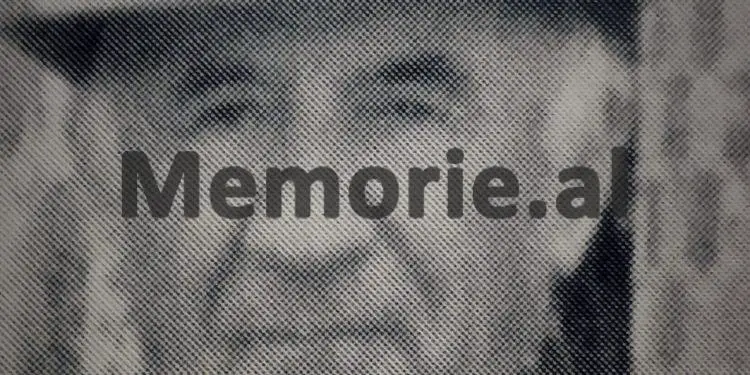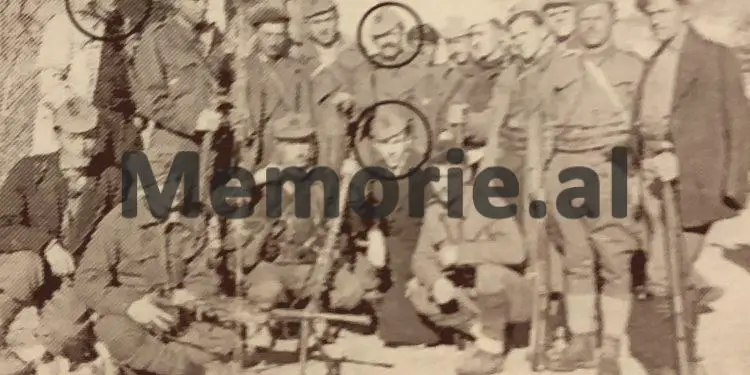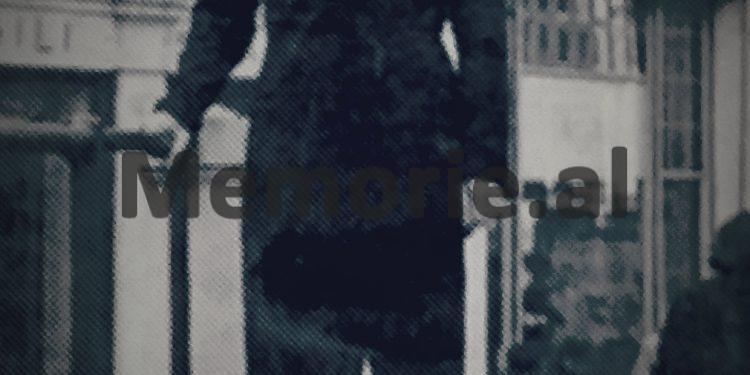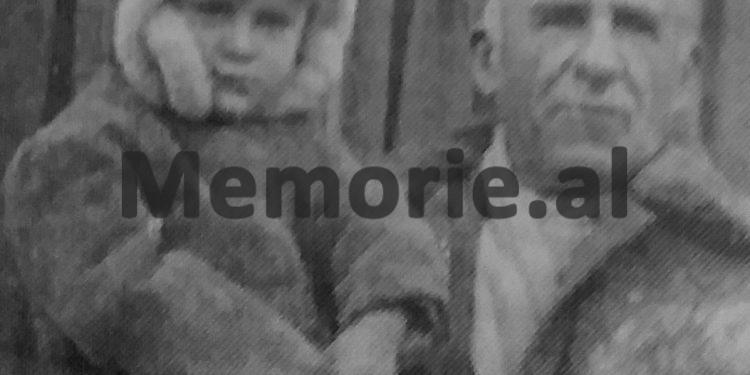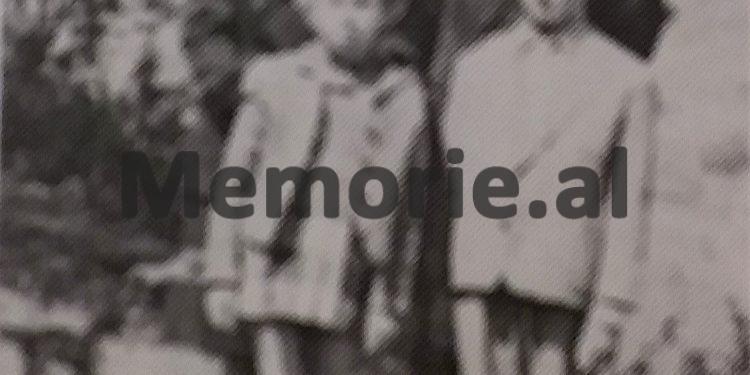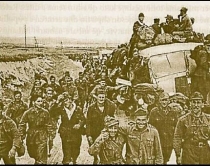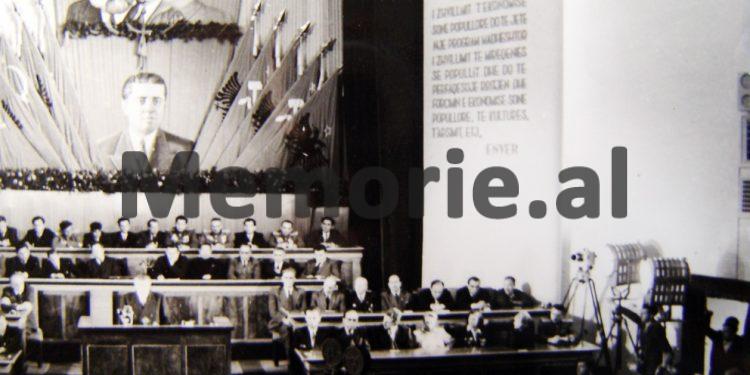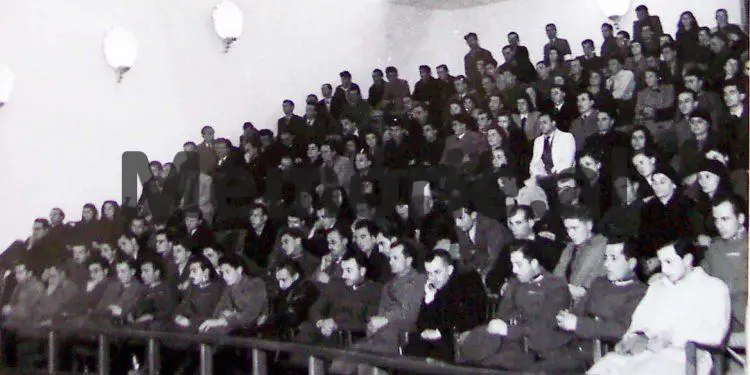Dashnor Kaloçi
Memorie.al publishes the unfamiliar story of the Party Conference for Tirana which was held at the Workshop Cinema from April 14 to 19, 1956, where some party organizations such as the New Albania Cinema Studio, Voice of Albania The people ”, Radio-Tirana, etc., raised numerous problems regarding the huge gap that had been created between the senior officials of the LLP leadership, the common people, and the many privileges that the members of the Political Bureau had. and government ministers.
Who were the delegates who issued the first accusations against the senior leadership of the ASP and the change the situation following Enver Hoxha’s arrival from Vlora and his entrance into the hall, which was greeted with applause and long ovations by most large of attendees? What were the accusations that Enver made to some of the delegates who had given the tone of that conference and the role of the Minister of Internal Affairs, Kadri Hazbiu, who was serving Enver… ?!
Enver Hoxha’s arrival in the hall was greeted with great applause by all the delegates because we thought he would agree with the problems that arose on the first day of the Conference. On the second day of the proceedings of the Conference of Tirana, in the afternoon session came Enver Hoxha himself. He interrupted his vacation in Vlora after being informed of what was happening in Tirana. Enver’s entry was greeted with much applause, as we still believed he would agree with those problems that arose on the first day of the Conference. After Enver took over the situation and began to oppose Vehip Demi, Colonel Iljaz Ahmeti, Director of the “New Albania” Cinema Studio, Nesti Zotos and several others who were regarded as anti-party organizers of that conference, he addressed the hall saying: Did Ihsan Budo see this, this is a tremendous curious and he does his best and wants to know it all. ”
Ihsan Budo, former head of the Saranda district communists during the war years, the Albanian government representative in Italy for War Reparations and deputy minister of collection, testifies to Memorie.al, his participation as a delegate at the Party Conference. Tirana in 1956, where he was described as “the enemy of the enemy” and all the vices that came from him, being interned for 31 years in the Kurbnesh mines and sentenced to 10 years in prison.
Ihsan, something brief for yourself?
I was born in the town of Gjirokastra in December 1920, where my family lived in the Palorto neighborhood. My father had no education, but the ancestors of our family were educated in Turkey and held positions in the local high administration of that time. My grandfather, Hazbi Budo, was the prefect of Permet, his brother, Musa, was the Prefect of Gjirokastra and the other brother, Mustafai, was the first Dean of the Faculty of Medicine in Istanbul and later the Head of Health of Vilayet of Ioannina. Likewise, his other grandfather’s brother, Refik Budo, has been one of the main supporters of Cerciz Topulli’s gang and has been recognized as a patriot. During the 1930s, for economic reasons, I was forced to discontinue classes at the Gjirokastra Gymnasium and went to work at the Saranda Power Plant. As I now remember April 7, 1939, when the Italian invasion ships sailing off the coast of Saranda that Black Friday.
Have you participated in the Anti-Fascist Movement?
Until October 1941, I was not involved with the Movement and I was not a Communist. On October 28, 1941, while in Tirana, I participated in the great anti-fascist demonstration that took place there. At that demonstration, for the first time, I saw Enver Hoxha, whom I did not know before. Some Gjirokastra told me that he was the son of Mulla Halil. After that demonstration, in January 1942, Myfit Dudushi, an old Gjirokastra revolutionary, called me and assigned me to be the head of the Saranda workers’ education group. Activating for that party duty I fell in love with the Italians, who on July 24, 1942, arrested me along with 35 other friends in Saranda. On October 15 of that year, after three months of investigation, I was able to be released with the help of Veliko Maliles, a Gjirokastra trader who paid 200 gold Napoles and released us all. The action Veliko did was a patriot, but it is unfortunate that after the liberation our communist comrades arrested him and after seizing all his property, they sentenced him to death. He served many years in prison and then died in Kavaja where he was interned.
After your arrest by the Italians, did you continue your anti-fascist activity again?
When I came out of prison, Bedri Spahiu, who was the secretary of the Communist Circuit of Gjirokastra, called me and after I was accepted into the party as a communist, he assigned me the job of party secretary for Saranda. The meeting with Bedri took place at the house of Qerime Tauzi, which was one of the strongest communist bases in Gjirokastra, where Qemal Stafa was also housed. I held this position until November 1944, when Albania was liberated.
After the war, what were your duties?
In December 1944, I was sent to Berat as a traffic officer, and in March 1946, I was returned to Gjirokastra as chairman of the Economic Enterprise. On April 1, 1947, I came to Tirana as director of the Industrial Items Company. During this time, I went to Yugoslavia twice to enter into employment contracts under the Economic Agreement between the two countries. Rejecting many problems related to that economic agreement, they wanted to expel me from the party as anti-Yugoslav, but I was defended by Gogo Nushi, Vasil Kati and Haki Toska. In 1948, I was appointed Director-General of the Food and Industrial Directorates, and then in 1949, Chairman of the Autonomous Collection Authority. After these duties, at the end of 1949, by the decision of the Political Bureau, I was appointed as a delegate of the Albanian Government in Italy, on the problems of War Reparations.
How long did you work on that task?
I worked for that job for 15 months and all the war reparations Germany paid to Albania came to our country via Italy. After that assignment, I returned to Albania, wherein 1950 I was appointed Director-General of Collection in Tirana. At that time, Hysni Kapo called me to his office and informed me that the decision of the Political Bureau, the assets that Albanian citizens had abroad, would be returned to Albania, and I would take on that task. In 1953 I was appointed Director-General of Worker Supply, from where I was appointed as a delegate to the Party Conference of Tirana in 1956.
What is the truth of that conference?
The Conference of the Tirana Party held its work at the “Puntori” Cinema from April 14 to April 19, 1956. That conference was held in the spirit of the decisions of the 20th Congress of the Communist Party of the Soviet Union, where Khrushchev condemned Stalin’s mistakes. and his cult of the individual. In this context, the activities of Tirana party organizations were also developed, where many problems were raised by a good part of the communists.
How do you remember the beginning of that conference?
On the day the conference began, Enver Hoxha published an article in the Voice of the People newspaper in support of the decisions of the 20th Congress and went on vacation to Vlora that same day. The conference was chaired by Beqir Balluku and Fiqirete Shehu (First Secretary of Tirana), Major-General Tahir Kadare, General Halim Ramohito, Haxhi Lleshi, and others I can not remember. Beqiri opened the conference and read the report by Fiqirete Shehu. That report was very coldly received by the delegates because it was dry and covered all the problems that had been discussed in the party’s assets and organizations.
What were these problems?
Sometime before the conference, in the activities of Tirana party organizations, such as those of the “Voice of the People”, Kinostudio, the Ministry of Industry, the newspaper “Puna” and “The Fighter”, etc., there was discussion and dissatisfaction. great for the difficult economic situation in which the common people lived and the privileges they had for senior leadership themselves. Many communists raised problems that in the event of the fall of the measles epidemic, senior leadership had only provided vaccines to their children and not to the children of the common people from outside, and as a result, the cemeteries were filled with child graves. So to speak, in the active ones, there was a massive revolt of the honest communists, against bureaucratized leadership, against its secession from the masses, against the methods of aggravating and exacerbating class struggle inside and outside the party, against the negative influence of the individual cult, etc.
Concrete accusations were raised against senior leadership for privileges?
Certainly, many delegates in the active cites cited evidence of degeneration of the leading constituencies, increased privileges of servility and conformism in party and state apparatus, the difficult economic situation in the city and the countryside, and criticized the euphoric propaganda that was made to tame it. and adorned the extremely difficult situation where the place was.
It was said that some delegates were also asked at that conference to rehabilitate some former senior APL officials who were convicted by Enver Hoxha?
Some organizations raised the problem of the rehabilitation of Sejfulla Maleshova, Tuk Jakova, Bedri Spahiu and some other communists, calling their punishment unjust, a problem of class struggle and international relations of Albania. After all these problems, after the report of Fiqh Shehu, the delegates asked written and oral questions and I remember that in the corridors of that conference there was talk of Mao Zedong’s theory of flourishing a hundred schools and one hundred flowers.
How were these demands received, namely the rehabilitation of some of Enver Hoxha’s closest associates who had been condemned as “enemies of the people” by those running the conference?
The rise of these problems electrified the room, and this situation continued until the second day, when Enver Hoxha himself came to the afternoon session of the Conference, apparently informed of the prevailing state of affairs.
What was the reaction of the Conference Presidium to the questions asked and what happened after Enver’s arrival?
For all the questions that were asked after reading the report, there was no statement from either the Presidium of the meeting or any member of the Political Bureau or Minister present because they did not know the position that Enver Hoxha would hold and you did not keep talking without knowing what their boss was going to say.
How do you remember Enver’s entry into the conference?
Enver’s entrance into the Conference Hall was greeted with great applause by all of us who made the criticism because we hoped to the end that he would agree with our spirit and criticize and take appropriate action for all those persons senior leadership who responded to the questions asked on the first day of the Conference. This belief also came from the article Enver published in Voice of the People, but unfortunately what we believed did not happen. Enver entered the hall as soon as he entered the presidency, followed by all the members of the Political Bureau who took the plate. Enver immediately spoke up and said, “Here was an electrifying situation.” After those words, he made a story of all the activities of the Communist Party since its creation. Throughout his speech, he was often applauded from across the hall. After Enver’s speech, many of his disciples were enlivened and various pressures began to be put on those delegates who asked the questions.
Who made those pressures, against whom were they directed and in what ways?
One of Enver Hoxha’s main supporters at that conference was Interior Minister Kadri Hazbiu, who had organized all of State Security, and after Enver’s speech, he immediately began pressures in various ways. The main Communists regarded as anti-partisans, enemies, traitors, and “heads” of the organization of that conference, to whom the pressures were directed: Vehip Demi, Colonel Iljaz Ahmeti, Nesi Zoto, Ihsan Budo, Vandush Vinçani, Taho Sejko, Pellumb Dishnica, Pajo Islami, Hulusi Spahiu, Adriatik Kanani, Amali Dishnica, Njazi Jaho, Ibrahim Zverku, Alfred Uci, Sofokli Afezolli, Qazim Vaqarri, Peco Fidhi, Agron Frashëri, Vasil Mici, and Masar Bektashi. It should be noted that Hulusi Spahiu, Peco Fidhi, and Pajo Islami were not delegates at all at that conference, but they were accused of being the “head” of organizing that conference that had encouraged other Communists to speak openly.Memorie.al
follows tomorrow




